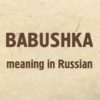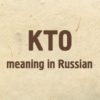Харэ зырить и лыбиться!
Hi everyone! I think I’m not going to be mistaken saying that even quite advanced Russian learners looking at the title of today’s podcast can understand only the conjunction “и”. But not to worry guys, if you continue reading this episode, you’ll be able to decipher the title yourself in just a few minutes. So, shall we start? 🙂
Всем приве́т!
Hello everyone!
Но́вая по́рция о́чень ру́сских слов и выраже́ний прибыла к вам с э́тим подкастом.
A new dose of very Russian words and phrases is brought to you with this podcast.
Начнём мы с глаго́ла лы́биться, кото́рый есть не что ино́е, как сино́ним к “улыба́ться” и́ли “ухмыля́ться”.
We begin with the verb “лыбиться,” which is nothing more than a synonym for “to smile” or “to grin”.
– Что ты там чита́ешь, что лы́бишься без конца́?
– Да кни́гу мне да́ли почита́ть, обхохо́чешься.
– What are you reading that smiling non-stop?
– Well, I was given a book to read, and it’s hilarious.
Обхохо́чешься происхо́дит от сло́ва “хохота́ть”, т.е. смея́ться, и здесь означет, что кни́га о́чень смешна́я. В други́х обстоя́тельствах, обхохо́чешься мо́жет означа́ть “слегка́” противополо́жное:
“Обхохочешься” comes from the word “хохотать”, i.e. to laugh, and here it means that the book is very funny. In other circumstances, the “oбхохочешься” can mean “slightly” the opposite:
– Ты тако́й смешно́й в э́той ша́пке!
– Ага́, обхохо́чешься.
– You’re so funny in this hat!
– Yeah, laughing out loud…
Здесь обхохо́чешься несёт в себе́ отте́нок иро́нии, и по су́ти зна́чит, что говоря́щий во́все не счита́ет ситуа́цию смешно́й.
Here “обхохочешься” carries a tinge of irony, and essentially means that the speaker does not consider the situation funny.
Перехо́дим к сле́дующему сло́ву, глаго́лу зы́рить, кото́рый, в свою́ о́чередь, означа́ет “при́стально смотре́ть”. Я вспомина́ю фра́зу из де́тства, кото́рой дразни́лись де́ти вокру́г: “Что зы́ришь? В штаны́ напузы́ришь!”
Moving to the next word, the verb “зырить”, which in its turn means “to stare”. I remember a phrase from my childhood that the kids around used to tease each other: “What are you staring at? You are going to bubble your pants!”
Ска́занное вы́ше означа́ет: е́сли ты продо́лжишь смотре́ть куда́ смо́тришь, то риску́ешь напусти́ть в свои́ штаны́ пузыре́й (поня́тно отку́да). Тако́е вот глу́пое де́тское выраже́ние. Наверняка́ оно́ ещё в хо́ду. 🙂
The above means: if you continue to look at what you are looking at, you risk to fill up your pants with bubbles (it’s clear from where). Just a silly childish expression. Surely it’s still in use. 🙂
Во взро́слой жи́зни лю́ди испо́льзуют зы́ришь, наприме́р, так:
In adult life, people use “зыришь” like that, for example:
А ты что зы́ришь на меня́, на мне кино́ пока́зывают что-ли?
What do you staring at me, is there a movie shown on me or what?
Хва́тит зы́рить по сторона́м, пошли́!
Enough staring around, let’s go!
Я не рекоменду́ю вам испо́льзовать сло́во зы́рить, обраща́ясь к посторо́нним лю́дям напряму́ю (осо́бенно к тем, чьё физи́ческое разви́тие превосхо́дит интеллектуа́льное). Звучи́т э́то сло́во дово́льно гру́бо и мо́жет привести́ к мно́жеству синяко́в, на лице́ в том числе́. 🙂
I don’t recommend you to use the word “зырить” to address strangers directly (especially those whose physical development surpasses the intellectual one). The word sounds very rude and can lead to a lot of bruises, on the face as well. 🙂
Бли́зкий по значе́нию к зы́рить, глаго́л пя́литься, означа́ет по су́ти то же – “при́стально рассма́тривать”:
Close in meaning to “зырить”, the verb “пялиться” means essentially the same thing – “to stare”:
Харэ́ пя́литься на витри́ны, пошли́ поеди́м чего́-нибу́дь!
Enough staring at the show-windows, let’s go eat something!
Харэ́ – э́то сокращённая и сугу́бо неформа́льная фо́рма сло́ва хоро́ш, что зна́чит “хва́тит”.
“Харэ” is a short and particularly informal form of the word “хорош” which means “enough”.
Хоро́ш уже́ мой акце́нт передра́знивать, я же то́лько учу́сь!
Enough mocking my accent already, I’m just learning!
Т.е. “хва́тит передра́знивать мой акце́нт”.
I.e. “stop mocking my accent”.
Ну что, хоро́ш на сего́дня. Всем мо́ре улы́бок и до ско́рой встре́чи! 🙂
Well, enough for today. A sea of smiles to all of you and see you soon! 🙂
Subscribe to our basic newsletter and receive notifications about new episodes of Very Much Russian podcast.
Or subscribe to our premium newsletter to receive both the basic newsletter and all our previous podcast episodes, one by one, on a regular basis.
Today's vocabulary
- зырить
Russian slang[ZY-reet'](slang) to stare - лыбиться
Russian slang[LY-bee-tsa]to smile wide - обхохочешься
Common Russian phrases[ab-ha-HO-cheesh-sya]laughing out loud; it's so funny - пялиться
Common Russian phrases[PYA-lee-tsa]to stare - харэ
Conversational Russian[ha-RE]enough









